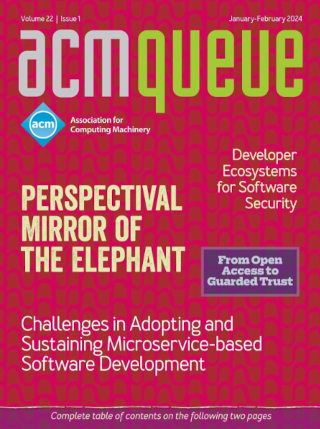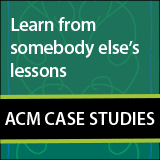
A Conversation with Cory Doctorow and Hal Stern:
Considering the open source approach
For years, the software industry has used open source, community-based methods of developing and improving software—in many cases offering products for free. Other industries, such as publishing and music, are just beginning to embrace more liberal approaches to copyright and intellectual property. This month Queue is delighted to have a representative from each of these camps join us for a discussion of what’s behind some of these trends, as well as hot-topic issues such as identity management, privacy, and trust.
Advice to a Newbie:
A koder with attitude, KV answers your questions. Miss Manners he ain’t.
Dear KV, I am new to programming and just started reading some books about programming, particularly C++ and Visual Basic. I truly enjoy programming a lot, to the extent that for the past couple of months I have never missed a day without writing some code. My main concern now is what the world holds for programmers. If someone is called a programmer (i.e., professionally), what will he or she really be programming? As in, will you always be inventing new software or what, really? This is mainly in the case of someone who will not be working for someone else. My other question is, can you really build a career as a freelance programmer, and what will you basically be programming?
Beyond Beowulf Clusters:
As clusters grow in size and complexity, it becomes harder and harder to manage their configurations.
In the early ’90s, the Berkeley NOW Project under David Culler posited that groups of less capable machines could be used to solve scientific and other computing problems at a fraction of the cost of larger computers. In 1994, Donald Becker and Thomas Sterling worked to drive the costs even lower by adopting the then-fledgling Linux operating system to build Beowulf clusters at NASA’s Goddard Space Flight Center. By tying desktop machines together with open source tools such as PVM, MPI, and PBS, early clusters—which were often PC towers stacked on metal shelves with a nest of wires interconnecting them—fundamentally altered the balance of scientific computing. Before these first clusters appeared, distributed/parallel computing was prevalent at only a few computing centers, national laboratories, and a very few university departments. Since the introduction of clusters, distributed computing is now, literally, everywhere.
DNS Complexity:
Although it contains just a few simple rules, DNS has grown into an enormously complex system.
DNS is a distributed, coherent, reliable, autonomous, hierarchical database, the first and only one of its kind. Created in the 1980s when the Internet was still young but overrunning its original system for translating host names into IP addresses, DNS is one of the foundation technologies that made the worldwide Internet possible. Yet this did not all happen smoothly, and DNS technology has been periodically refreshed and refined. Though it’s still possible to describe DNS in simple terms, the underlying details are by now quite sublime. This article explores the supposed and true definitions of DNS and shows some of the tension between these two definitions through the lens of the Internet protocol development philosophy.
Ode or Code? Programmers be Mused!:
Is your code literate or literary?
My sermon-text this grumpy month is Matt Barton’s article “The Fine Art of Computer Programming”, in which he extols the virtues of what is widely called literate programming. As with the related terms literary and literature, we have ample room for wranglings of a theological intensity, further amplified by disputes inherent in the questions: “Is computer science or art?” and “What do programmers need to know?” Just as we must prefer agile to clumsy programming, it’s hard to knock anything literate. Competing methods tend to sound, like, man, kinda illiterate, a term with such a bad reputation that cultures that have not yet invented or borrowed a writing system are called preliterate.
The Evolution of Security:
What can nature tell us about how best to manage our risks?
Security people are never in charge unless an acute embarrassment has occurred. Otherwise, their advice is tempered by “economic reality,” which is to say that security is a means, not an end. This is as it should be. Since means are about tradeoffs, security is about trade-offs, but you knew all that. Our tradeoff decisions can be hard to make, and these hard-to-make decisions come in two varieties. One type occurs when the uncertainty of the alternatives is so great that they can’t be sorted in terms of probable effect. As such, other factors such as familiarity or convenience will drive the decision. This, too, is as it should be.





